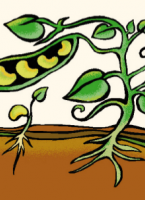Voedsel Anders Conference 2016: A Personal Impression
Topics
Regions
In February 2016 the second Voedsel Anders conference brought people together to build new connections and relationships within the food movement in the Netherlands, Belgium, and around the world, and to begin working towards a shared agenda and strategy for the movement. Over a thousand participants, some returning and some attending for the first time, gathered in Wageningen to discuss food system problems and solutions, plant the seeds of new ideas, build new connections, and grow the movement.

The conference was a very successful follow up to the 2014 “Food Otherwise” / “Voedsel Anders” conference, with more than 30 dynamic organizations and initiatives working to create a new kind of food system. Both interactive, two-day events gave people passionate about creating a better food system in the Netherlands and Flanders a chance to come together and begin building a more cohesive movement. The organizations involved work on issues ranging from the environment, to young farmers, to international solidarity or development; their activities range from farming and research, to advocacy and activism, and yet they share a commitment to creating a different kind of food system.
- Opening and welcoming
- Opening Keynotes: Jonathan Karpathios, Irene Cardoso, Jyoti Fernandez
- Monsanto Tribunal
- Debate: The future of agriculture and food (with live illustration by Remco de Kluizenaar)
- Piet van Ijzendoorn & Arjen Wals: Visions of food system transformation
- Reclaim the Seed
- Olivier de Schutter
- Nyéléni Europe Forum 2016
- Workshops
- Concluding Comments from Jan Douwe van der Ploeg
Opening and Welcoming
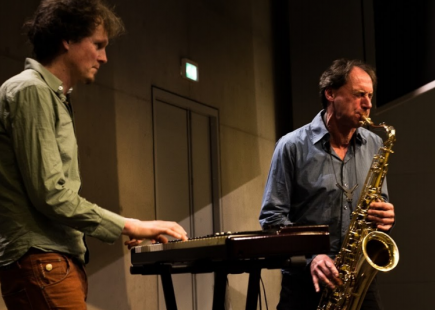
Daniel Gomez
The opening sessions helped to set the tone for the conference: discussion came together with art, and a diverse and growing movement was welcomed to one of the Netherlands most prestigious agricultural universities. Participants began arriving in the early afternoon of February 12 to musical accompaniment by Yeraz: piano and saxophone greeted the diverse crowd as the room filled with the first buzz of a conversation that would carry on over two days.
Evelijne Bruning, director the The Hunger Project, welcomed the crowd of new and veteran participants. An exercise revealed a mixed group, spanning many decades of age, hailing from at least five continents, and identifying themselves as students, researchers, farmers, entrepreneurs, consultants, activists, politicians and more, all drawn together by the goal of creating a better food system. We began to get to know each other, introducing ourselves to our neighbours under Evelijne’s guidance and reflecting, at the outset, on what would make Voedsel Anders a personal success for us, and how we could make it happen.
Arthur Mol, Rector Magnificus of Wageningen University welcomed the audience to the institution, setting the stage with a discussion of the growth of global population and demands for food, and the growing recognition of the need for sustainable food. He reminded us that these questions are current, urgent, and complex, and that we must base our discussions in evidence, but look beyond narrowly scientific notions of sustainability or food safety to address fairness, transparency, identity, and social sustainability. He concluded with the hope that we will meet again in the future: the conversations started here will not be finished in two years, let alone two days, but it is very important to start them, and to carry them on.
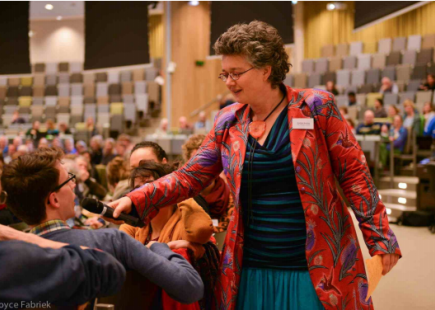
Joyce Fabriek
During the Conference:
- Attendees were welcomed on the first day with music by Yeraz, on piano and saxophone, helping to set the tone of relaxed and creative conversation that would carry on for the two days of the conference
- 60 workshops in English and Dutch offered participants the chance to dive in depth into topics like intuitive agriculture, composting, fighting food waste, the role of meat in land grabbing, edible landscapes, short food chains, urban agriculture, food co-operatives, pesticides and biodiversity, land rights, food sovereignty, and much, much more;
-
Conversations rolled on into the evenings, carrying over from lectures and workshops into packed evening gatherings;
-
Fresh, hot, vegan and vegetarian meals were cooked and served by volunteers at Rampenplan;
-
Two different groups of musicians entertained the crowd and added emotional depth to the discussions;
-
A live-illustrator accompanied panel discussions, sharing his perspective with the audience and creating beautiful images shared widely over social media
-
Participants overflowed into the vibrant Reclaim the Seed Festival next door to celebrate and learn about seed saving and the need for seed sovereignty, and to swap or buy seeds;
-
75 volunteers supported to conference in a wealth of ways including baking home-made goodies to keep participants going; 
-
Our facilitator solicited views from the audience, and made sure that everyone was heard and had a chance to connect with people to argue or collaborate, arranging dates and ad hoc discussion groups to meet between sessions;
-
Dutch-Greek chef Jonathan Karpathios developed a recipe for delicious vegetarian “beet”erballen which were cooked up for the group and served at the closing party;
-
Jan Douwe van der Ploeg was awarded the first Food Otherwise award for his 40+ years of work with farmers, connecting the Academe to social Conversations carried on into the evenings (Aart-Jan van de Glind) movements and food producers;
-
Inspirations were exchanged, ideas cross-pollinated and the seeds of new collaborations and partnerships were planted.
Opening Keynotes: Jonathan Karpathios, Irene Cardoso, Jyoti Fernandez
Three keynote speakers from different backgrounds and sectors shared their perspectives about the necessity and urgency of change in global food systems.
Jonathan Karpathios, a Greek-Dutch chef told the gathered listeners about his passion for food, developed through years of work as a chef, and his realization after the birth of his son that he needed to find a way to continue to practice and exercise this love of quality food in a sustainable way, connected with nature. He left his kitchen (temporarily) to work with a Greek farmer, learning more about sustainable farming and realizing that there are farmers in the world who grow and raise food with the same attention and passion with which he cooks it. Jonathan argued that we must adjust our understandings of quality and realize that truly quality food means food which is raised in healthy soil, and treated with love and care, from the field to the plate. He ended with a call about the urgency of changing the way in which we live with nature, reminding us that while Mother Nature does not need us, our survival depends entirely on her.
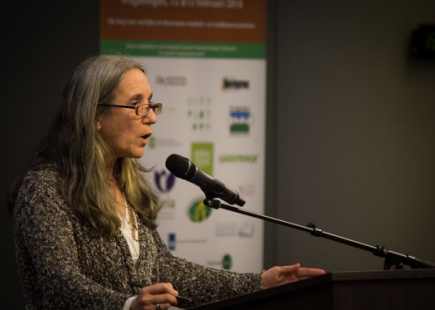
Daniel Gomez
Irene Cardoso, a researcher from Brazil and chair of the Brazilian Agroecology Alliance, shared the perspective from Brazil and argued that agroecology should be understood as simultaneously a science, a practice, and a movement. The need for sustainable food is intimately tied to the need to support family farms and to recognize farming as a cultural practice. Family farms can and do engage with markets but they represent a different way of working with nature. Agroecological farmers, many of whom are also family farmers, reject over-use of chemical inputs, and environmentally destructive and socially damaging farming practices. Irene shared examples of large-scale agroecological projects which nonetheless remain true to the principles of the movement, and contrasted these with massive and chemical- intensive production of, especially, soy beans and sugarcane which are destroying distinctive and biodiverse regions of Brazil. She ended with a discussion of the importance of growing agroecology as a social movement which she and her allies do by: working strategically with policy makers; hosting conferences and sharing knowledge; using peasant-to-peasant knowledge exchanges; working with researchers and universities to further develop scientific knowledge without disregarding traditional knowledge; and staging public demonstrations, among other tactics. Irene concluded by reminding us that everyone eats and, therefore, everyone should be engaged in the struggle for a more just and sustainable food system.
Finally, Jyoti Fernandes brought the perspective of a young farmer in the UK. She spoke passionately and volubly about the importance of recognizing agriculture as a source of meaning and culture, as well as of sustainable food. A member of Via Campesina, the Land Workers Alliance, and a co-operative producing local and sustainable food, she argued that land-based human cultures are the foundation of sustenance, and that we have the resources to produce wholesome, sustainable food that nourishes people, land, and culture together. She spoke of the resilience and creativity of a generation of new farmers like herself, many from non-farming backgrounds, who are committed to using every creative tool and strategy at their disposal to produce food that they can believe in, in the face of a policy environment which favours a very different food system.
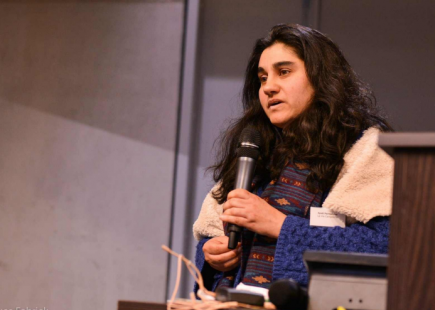
Joyce Fabriek
Jyoti’s own children, and her contemplation of the kind of life she wanted them to lead – and the life she wanted to lead with them – helped to inspire her movement to the land but she discussed the major obstacles the she and farmers like her face. Fundamentally, land-based cultures require land: the kind of sustainable, embedded, culturally rich food systems that many new farmers are working towards are not possible without access to land. While creative solutions like CSAs and co-operatives, shared tools and on- farm processing can make it possible for some farmers to survive, these are comparatively small niches and a transformation of the food system will require an equally large transformation food and land policy to truly support sustainable food production. Jyoti reminded us: this is what needs to be done, if we want a future for our planet.
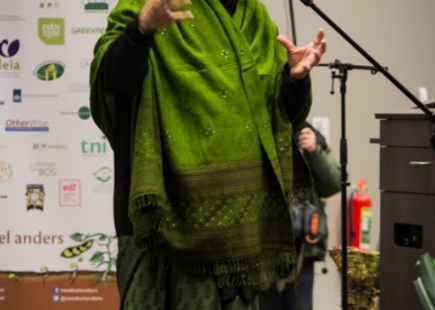
Daniel Gomez
In a surprise appearance, international activist Vandana Shiva joined Voedsel Anders to share the news about a range of upcoming actions which will take place around the Monsanto Tribunal to be held in the Hague from 12-16 October 2016, concluding on World Food Day. Monsanto will be tried for crimes against humanity, in recognition of damage to the environment, the criminalization of seed-saving and related immiseration of farmers, their lawsuits against governments around the world who ban their products, and more.
On the 12th and the 13th of October, seed and food festivals will celebrate alternatives and resistance. On the 13th and 14th, a public trial will be held. Finally, on the 15th and 16th a formal tribunal including a panel of international judges will sit in judgement of Monsanto.
Everyone at the conference (and reading this impression) is invited to be involved, by planning an action, sharing ideas, supporting through crowd-funding, or helping to grow the networks of the movement by identifying other people who should be involved. In this way, Vandana Shiva urged the crowd, we can speak as a collective voice of sanity and freedom against irrepressible tyranny.
Learn more about the Monsanto Tribunal at http://www.monsanto-tribunal.org/
“Aha!” Moments
Coming together as a movement is about sharing inspiration, and cross-pollination of different ideas and sections of the movement. At the end of the first day, the gathering paused to share their “Aha!” moments from the day’s workshops. A few thoughts which caused people to stop and think:
-
Intuitive agriculture workshop: We should farm not only with our brains, but with our hearts as well.
-
Compost workshop: these debates are not one- sided; we cannot imagine one kind of agriculture that fits for everyone and every place
-
The economic definition of profit is tiny: people, profit, planet captures much more of what is really happening in the world
-
A core question for sustainable farming is: how do you put healthy soil at the centre of everything you do?
Debate: The future of agriculture and food (with live illustration by Remco de Kluizenaar)
Panel 1: Agroecology: The New Mainstream?
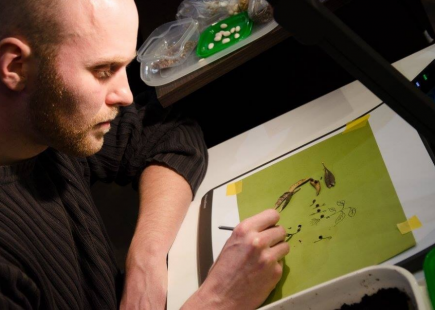
Aart-Jan van de Glind
Martin Van Ittersum, Wageningen professor, and Irene Cardoso of the Brazilian Agroecological Alliance discussed the role of agroecology in building a more sustainable food system. Professor Van Ittersum began by introducing the crowd to the concept of yield gaps – the distance between the maximum that scientists believe a certain crop can produce and how much it actually produces in the field. He argued that agroecology may help to reduce yield gaps, especially in Europe, but it is unlikely to be effective enough to feed local populations in the global south. The crowd joined the discussion, questioning the methodology of yield measures (which often focus on single-commodity yields per acre, rather than total food produced, potentially misrepresenting polycultural systems), as well as arguing that absolute production may be a red herring in a world where 40-50% of all food is wasted.
Throughout a lively, occasionally rowdy, debate about the colonial overtones and misconceptions grounding the notion of “feeding Africa,” Professor Van Ittersum argued that, while moderating western diets, reducing waste, and potentially addressing global inequality are important, on their own they will not feed a global population of 9 billion a sufficient, healthful diet. He argued that, when talking about the kind of food system we want, it is important to recognize that conditions, and therefore the problems people face differ around the world: the solutions may also differ.
Throughout the debate our charming moderator arranged “dates” for discussions of specific points to be discussed over drinks after the end of the formal session, opening the space for one-on-one debates and a deeper engagement with other positions, across political boundaries.
Irene Cardenes took the stage to explain how agroecology is already on the road towards becoming mainstream in Brazil, supported by scale-appropriate policy and a focus on family farmers, who currently produce 70% of Brazil’s food. However, there are still major obstacles to this becoming the true mainstream in Brazil: chemical-intensive, export-driven agriculture
continues to consume huge amounts of land and resources. The way the universities are organized helps to perpetuate a gap between theory and practice. Peasant to peasant methodologies which connect extension, education, and research are helping to grow the movement and create space for it to enter and transform the mainstream.
Questions from the assembled audience ranged over broad perspectives: how do we bring non- human life into discussions of ‘feeding the world’ to imagine a future that still retains other life?; how do we talk with people, rather than about them, for example in the question of ‘feeding Africa’?; What role does land-grabbing play in global hunger?; Does the massive funding gap between agroecology and conventional agriculture skew our evidence and our perspective on what is possible?; how do we ensure that conventional agriculture keeps developing and becoming more sustainable?
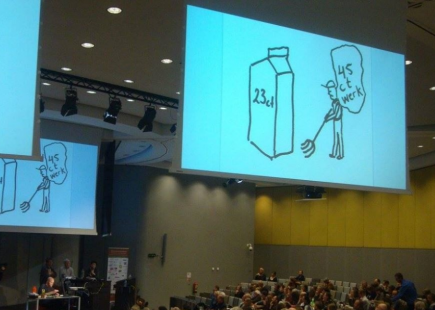
Guus Geurts
Panel 2: Policy Options for a fair income for farmers and world-wide food security
After giving the audience a moment to “shake off” one debate and prepare themselves for the next, Sieta van Keimpena, Niek Koning, and Frits van der Wal took the stage to discuss the role of policy in improving (or perpetuating) problems in the global food system.
Sieta van Keimpema opened with a discussion of the challenges facing farmers today. She identified the effects of the abolition of EU dairy production quotas on Dutch dairy farmers – the price of milk has fallen well below the cost of
production, and cheap processed products are being sold very cheaply in the developing world in an attempt to deal with the available surplus and keep prices from sinking further. She argued that, to prevent this kind of situation, we need to have the ability to put the brakes on markets. The Dutch Dairymen Board have consistently campaigned for a controlled volume of production, with export only of products that are distinctive to the Netherlands or can be best produced here, while government strategy wants to conquer new markets with high production.
Niek Koning spoke about the relationship between prices and food security, and the question of whether there is already enough food in the world. He argued that the current state of
global abundance is fed by fossil fuels, and has led to a significant growth in global population, which can only be slowed by economic development. Every rich country historically protected their agriculture to allow development, which in turn slowed population growth. He argued that a number of pressures from water scarcity to demand for bio-fuels are converging and will create threats to global food security in the future. In this context leaving global food production to the market is a huge gamble.
Frits van der Wal introduced the crowd to the Food Security Cluster with the Dutch Ministry of Foreign Affairs and the importance of working across disciplines and silos to develop policy solutions for food security. He discussed the possibilities for transformation in the food system, and the need for fair prices for farmers which allow not just a living wage but re- investment in farms. He argued that policy is usually oriented towards low prices for
consumers, because they are the bulk of voters, although other panelists pointed out that there are also consumers who want farmers protected more than they want low prices.
The panelists discussed the role for the Dutch government in, for example, dictating the terms of international trade (through trade agreements) in a way that either disadvantages or protects farmers around the world. Panelists also discussed the fundamental goals of European agricultural policy (as laid out in the Lisbon treaty), to support stable markets and fair income for farmers, and whether these goals are being met by policy today. They raised concerns about the “bio economy” and use of land to produce non-food products, as well as about the ‘pseudo- liberalization’ in current world markets, where richer countries continue to support their farmers while demanding the opening of markets in developing countries. Panelists disagreed about degree of the impact that rich nations have on internal agricultural policy in developing countries, and the state of agriculture around the world.
The audience raised questions about the relative importance of the economy in an ecological crisis, about the role of policy in determining a fair wage for farmers, and what policy-makers are in a position to make these changes. The panelists helped to raise and address many difficult questions in this debate: how can global development and farmers around the world be supported?; What is the relationship between the needs and demands of local farmers, and those of farmers elsewhere in the world?; What role does dumping from Europe and other developed economies play is undermining development?; What role does global trade play in ending or perpetuating global poverty? In the end this debate ended without a clear resolution, but the evening closed with the thought “There is no solution yet, but there is still tomorrow”.
Throughout both debates Remco de Kluizenaar’s live illustration helped to whimsically capture the key themes and points of the discussions, fleshing out points with charming illustrations of farms and farm issues.
Musical Theatre
We think with our hearts as well as our heads. The second day of Voedsel Anders 2016 opened with a musical contribution by Noortje Braat and Egon Kracht: they shared songs of action, of sadness, and of hope. One particularly poignant piece was a love song to the food system which is passing away. Taking the perspective of someone who has invested themselves, their life, and their hope, in a system which is now, slowly, falling apart, Noortje sang wrenchingly of grief and betrayal, of being blind with love and with certainty, and of awakening to disenchantment. As we push towards transition, finding the legitimacy in the grief of those who believed and invested in the old system, recognizing that losing or rejecting something which you have poured your heart into is a real tragedy, is important to find our way through this transition. Compassion can help us to reach across political divides for allies. Other songs struck a more hopeful note, and dealt with the possibilities for other ways of doing things. Even to a less-than-fluent Dutch speaker, the emotional content of the songs was powerful and gave a depth and urgency to the discussion to follow.
Piet van Ijzendoorn & Arjen Wals: Visions of food system transformation
Piet and Arjen discussed the role that education, among other things, can play in making possible a transition to a new kind of food system, and how we can support this kind of transition.
Arjen opened by addressing the question of how the transition towards a just and sustainable food system can be strengthened. He argued that there is a tension between optimization and transition: do we need to improve the system, or replace it? Some people in the food movement believe that we need to do things better, others argue that we need, instead, to do better things. How do we reach a place where we can involve as many people as possible in the movement? He spoke from the perspective of an educator, and suggested that we need to reject a world view which sees each environmental and social issue as separate. Instead we need to recapture a holistic view which we all tend to have as children, and which is educated out of us.
Arjen argued that although there are reasons to be hopeful as more people pay attention to these issues, the tendency to split into separate disciplines, and understanding people primarily as “consumers” can be an obstacle to developing synergies and building towards transition.
Further, we need to recognize the role of conflict in education and in food system transformation. We need to get to work on developing not just adaptive capacity but disruptive capacity – tools to disrupt the remarkably robust and resilient food system currently in power, and to call this into doubt.
Piet van Ijzendoorn shared the ways in which his own embracing of agroecological farming was made possible by a critical attitude to education and to received wisdom, and an interest in how things could be done differently and done better than they were in the chemically intensive mass- production model that was becoming popular when he entered farming. This led him to a kind of transition within himself, and to the recognition of the need to work with the Earth, rather than against it.
He argued that, to be in control of nature and of our lives, we need to address the problems of huge inequality in the world today. We need to make a transition which is personal, economic, social, and ecological and which moves us from a world view driven by scarcity to one driven by abundance. For this to be possible it is critical that farmers are allowed to really farm, that they have the land they need, that policy is geared towards local food production, not export markets, and that farming itself is oriented towards building up the health of the Earth and the soil. Most of the workshops held here over these two days demonstrate models of transition, examples and ways of bringing about further transition. The panel concluded with the audience sharing their experiences and examples of transition.
Panel 2: Leen Laenens, Jocelyn Parot, Jack Stroeken: Strategies for the food movement
Representatives of VELT (an organization promoting ecological living and gardening in Flanders and the Netherlands), Urgenci (the international network for community supported agriculture), and Slow Food Netherlands, came together in the final panel discussion of the day to discuss strategies in the food movement. Jocelyn opened with a discussion of CSAs, suggesting that one reason they are so potent is because they not only offer an alternative to the dominant food system but are also a brilliant pedagogical tool – a way for people to learn about their food and to understand what transition would mean and look like in their own lives. This can be an antidote to the fear of transition which people invested in the current system and worried about losing their jobs and livelihoods may feel.
The panelists emphasized the importance of a movement being conscious of itself as movement, from coming together in events like this, to developing community charters etc. to allow it to continue to grow and evolve. Finally Jocelyn told the audience that recognizing CSAs as a part of the broader movement for Food Sovereignty, particularly through participating in the first European process on Food Sovereignty, was of decisive importance to the growth of their local movement. European organizations will gather again in Romania in October 2016 and this will be an important chance for the whole movement to come together to develop a shared action plan.
Leen, representing VELT, spoke about the development of a broader food movement in Belgium, and the connections between VELT and the transition movement. She discussed how agroecology came to be a key term in the organization, and how it captures a great deal of what their members mean in talking about ‘transition’. Agroecology and knowledge-sharing can help to grow the movement and develop new ways of working. Further, to grow a movement it is vital that we connect with each other so that we can develop a perspective which is both broad and deep. VELT has facilitated this process locally by developing an agroecology platform – a space for people to meet and exchange knowledge and ideas. These processes, however, will take time: we need to balance patience and urgency for deep and long-term change. Finally, Leen also emphasized the importance of acting on multiple fronts: not just developing or knowledge and understanding but holding governments and companies accountable for their choices and decisions, e.g. through the upcoming Monsanto tribunal and related movements to pressure governments to take responsibility for the survival of farmers, through lawsuits and other means.
The final speaker, Jack Stroeken, representing Slow Food Netherlands, shared some of the strengths of that movement. Slow Food is focused on ‘good, clean, and fair food,’ with a focus on preserving and expanding biodiversity within the food system, in plant and animal varieties, but also in research and farming systems more metaphorically. The movement has grown to more than 100,000 paying members globally (3000 in the Netherlands). Slow Food is organized into local “convivia” and “presidia” and is focused on building alliances between e.g. farmers and chefs in order to help to showcase the positive and the pleasurable in local food. The role of “conviviality,” focusing on the comfort and pleasures of growing, cooking, and eating together has been highly important to the success of the movement, as has the focus on building non-hierarchically, working always from the bottom up rather than from the top down.
The audience joined in to share their own examples of transition, from working with seed banks to preserve heritage plant varieties, to developing a movement of ‘slow science’ to support social movements. The panel concluded with practical advice for movement-building: to focus not on scaling up, but scaling out, cross- pollinating, and finding allies.
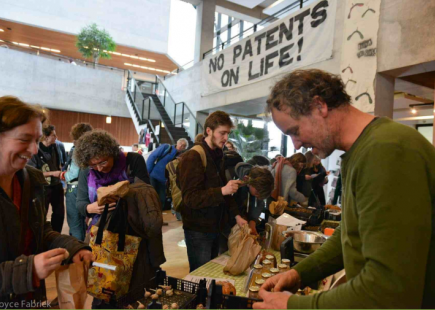
Joyce Fabriek
During lunch or in moments snatched between workshops on Saturday, participants of Voedsel Anders had the chance to join an allied event next door. Reclaim the Seeds brought together thousands of participants to swap their own seeds, buy or sell heirloom and heritage varieties, and participate in workshops about seed saving and other key topics. This was a boisterous gathering, crammed with people dreaming of their summer gardens and eagerly buying and trading seeds, bulbs, and roots. The right and the ability to save and trade seed is critical for food sovereignty and this celebration of free and community-owned seed was a perfect accompaniment to, and illustration of the values and principles of, Voedsel Anders.
Olivier de Schutter
Olivier de Schutter, though delayed by train problems, arrived in time to discuss the question of transition. He argued that the transition to a sustainable food system tends to be perceived in terms of policy and economic instruments, but that this conception is insufficient and relies on a top-down vision of power as something which is
exercised from above or, occasionally, seized from below. He encouraged us to conceive of power as something which is exercised in all everyday relationships. This way of thinking can lead us to a range of solutions which are less homogenizing, less top-down, and less oblivious to local difference. He argued that conceiving transition as a top-down process has impacts on our behaviour, and leads us to focus our attention on symptoms, rather than causes: food systems are failing to deliver health and well-being for all because of deep structural issues in the way research is organized, because of cultural lock-ins or questions of how people are accustomed to organize their lives, and because of political lock-ins, or the ability of those currently in power to block change.
To address these issues we need ideas and models of transition which 1. start from the bottom, as for example in recognizing and celebrating city-level solutions; 2. embrace solutions which do not come from “experts” but from ordinary people working out local solutions – e.g. Transition towns and 3. find a mix between ‘vote, voice, and exit’ - using all existing political instruments as well as opting out and developing
autonomous alternatives. We cannot give up on the political process, but also cannot rely on it as the only source of change.
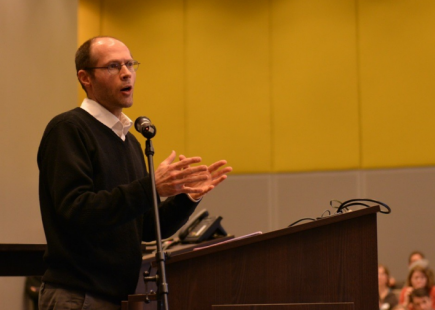
Joyce Fabriek
Ultimately, we need to re-think political decision making: In the 20th century representative democracy was our main instrument; voters selected politicians to make all major decisions for them, and were only minimally and occasionally involved in decision making after that point. We need to put creative thinking about solutions back in the hands of the people who are affected by them, and who understand them.
When asked for advice for the Voedsel Anders network de Schutter politely pointed out that experts giving advice to social movements is something which happens too much already, but suggested that ideas of scaling out, rather than up, supporting individual initiatives with structural reforms, continuing to hold politicians and others accountable for their actions, and emphasizing food education, as raised by previous presenters and panelists, all have a role to play in growing the Voedsel Anders movement and building a different kind of food system.
In October 2016 the second European Forum on Food Sovereignty will take place in Romania, hosted by the organic farmers' organization 'Eco Ruralis Romania' in order to strengthen and broaden the movement in Europe. This meeting will be a follow up to the significant and successful Nyéléni Europe Forum held in Austria in 2011, which brought together more than 400 representatives from 34 countries, to discuss the struggles and strategies of a European Food Sovereignty movement.
It is time to take this conversation further. Organizing for the 2016 Forum is happening now. The Forum will be attended by national delegations, but in order to make the process as inclusive as possible it is important that it is preceded by strong national consultations. This will allow delegates to share the needs and goals of everyone in their networks. To find out more about the Nyéléni Europe process, and its namesake, Nyéléni, visit http://www.nyelenieurope.net/en.
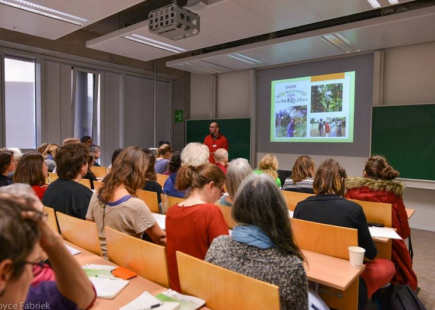
Joyce Fabriek
The true essence of Voedsel Anders was found in the 60 workshops which took place over the two days, splitting people into smaller groups to share findings and research, brainstorm solutions and next steps, debate, and build new connections and alliances. Taking place in both Dutch and English, with a diversity of themes, formats, and topics, the rich offering presented some difficult choices to attendees, but gave us the opportunity to delve into new topics or old specialisms. In general workshops featured ample discussion and opportunities for all participants to share their knowledge, questions, and diverse perspectives. The workshop offerings were divided into four key themes, with varied discussions in each area: • Agroecology; • Access to Land and Land Rights; • Fair Agricultural and Trade Policies; • Short Chains and Urban Agriculture. Details on just a few examples follow below.
Towards food sovereignty that works: presentations and discussion on a strategy for the food movement
This workshop profiled initiatives to bring agricultural workers into discussions of food sovereignty. Although workers are a huge part of our food system, discussions of food sovereignty more often focus on consumers and independent food producers, and say relatively little about labourers including food processors, factory workers, fast food workers, and farm workers. This workshop aimed to change that. Karin Astrid Siegmann’s presentation, read by the moderator as she was unable to attend, introduced the Immokalee Workers movement, a highly successful non-traditional union of tomato workers in Florida. The Immokalee workers have worked to achieve better wages and working conditions. Unusually, they have succeeded by directly approaching large-scale end buyers of tomatoes, especially fast food chains but also supermarkets like Walmart. They have used a variety of tactics including buying shares in companies in order to attend shareholder meetings, and working with consumers to pressure companies. This strategy emerged out of a recognition that tomato farmers themselves are increasingly caught in food chains over which they have little control.
The second presenter, Giulio Iocco, presented his research on two food sovereignty alliances in southern Italy, with a focus on SOS Rosarno, an initiative in Calabria which arose in response to racial violence threatening agricultural migrant workers, as well as generally poor and temporary labour conditions. This project was co-started by farmers and farm workers, who saw that they faced many related and interacting issues in the food system. With the support of politicized consumers and an already-active alternative food system in this region, these farmers and workers have been able to move away from commodity production of oranges for industrial processing and develop more diversified farms. They have incorporated as a workers’ co-operative: all workers not only receive a living wage year- round (rather than having to move continually to find work), but are also democratically involved in decision-making about their work.
These examples prompted a discussion of how the food sovereignty movement can better engage with workers. An important point that emerged was that alternative food chains, while valuable, are small scale by definition – taking on mainstream food chains will involve working both with the state and with the large scale food processors and buyers who are the major players in the mainstream food system.
New organizational forms: Co- operative stores: by, through, and for the community:
This workshop introduced the idea of co- operative stores, an emerging model in the Netherlands and Belgium. The workshop was specifically focused on full-time stores with their own premises and paid staff as opposed to other models like buying clubs run by volunteers. Although these face more challenges, they also have the opportunity to act as a more viable alternative to mainstream supermarkets, challenging ideas about what a supermarket is by providing a space for community to gather and grow, as well as to buy food.
Presenters from Bees Co-op (Belgium), Gedeelde Weelde (Maastricht), and De Nieuwe Graanschuur (Amersfoort) shared their experiences, leading into a discussion of how to start a food co-op. Co-operatives have the capacity to bring together consumers and producers into new kinds of relationships, and to allow them to connect and build community rather than communicating solely through price. This is particularly the case in co-operatives like Bees Co-op, which has farmer, consumer, and worker members (multi-stakeholder co-ops). In these cases, groups who the mainstream food system sees as in conflict (consumers trying to drive prices down, producers trying to drive them up) are able to forge new relationships and work as allies.
Co-operative grocery stores demand more of their members than ordinary stores, but this can be an advantage as well as a challenge. These kinds of stores, with a social purpose and mandate beyond cheap food, offer people a chance to learn about their food and to practice democratic skills and community problem-solving, offering the chance to become co-producers and to think radically about what we want from our food system. These possibilities were illustrated by the presenters’ stories.
The workshop concluded with a lively discussion about starting a food co-operative, including some guidance from bodies like the Co-operative Grocers’ Association who offer guidelines on how to begin a food co-operative. Hopefully some seeds were planted and the obvious interest and enthusiasm of the audience gives rise to a growing co-operative movement in the Netherlands and Belgium.
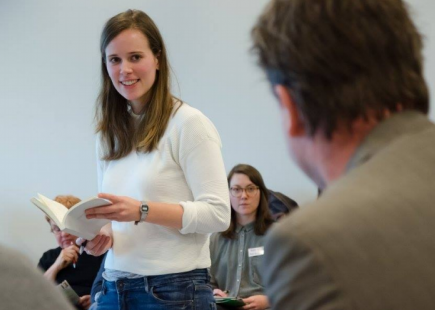
Aart-Jan van de Glind
Strengthening the Food Sovereignty Movement in Europe:
This workshop developed themes from three workshops in the Access to Land and Land Rights workshop stream, brought together small scale farmers, shepherds, and fishers, and prompted further discussion on growing the food sovereignty movement in Europe.
Panelists began by addressing their relationships with broader movements. Most identified as part of multiple connected movements: food sovereignty, La Via Campesina/the global peasants’ movement, the Solidarity Economy movement, and the artisanal fisheries movement.
Panelists discussed the need to cultivate food systems centred on people rather than profit. Alliances between consumers and producers emerged as an important theme, though several
panelists cautioned that producers’ perspectives need to remain central in the movement: small- scale and peasant food producers are most closely tied to food production and are therefore highly knowledgeable about challenges, opportunities, and alternatives. This knowledge needs to influence policy processes, and consumers can be powerful allies in making this possible.
“Food sovereignty” was identified as a key concept that helped to articulate the shared concerns of consumers and producers, and which could be used to bring people together ‘under one umbrella’ as allies and as citizens. It was suggested that building food sovereignty requires: resistance to harmful practices, transformation of existing mechanisms (e.g. subsidies), and the construction of alternatives.
Concluding Comments from Jan Douwe van der Ploeg
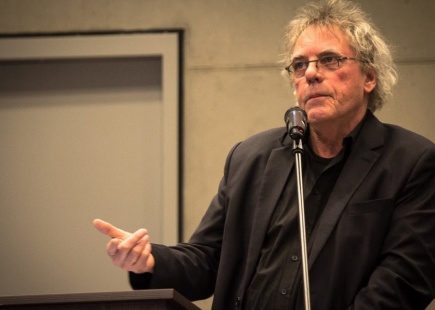
Daniel Gomez
Jan Douwe van der Ploeg spoke to sum up the conference and draw together some of it’s major themes. He began by celebrating the scale of this conference as a sign of the strength of the movement: over 900 people, 4200 cups of coffee, 75 volunteers, many supporting organizations from all sectors, and dozens of workshops where new alternatives are discovered. He argued that creativity is an act both of resistance and responsibility: creating new solutions requires challenging the system, but this is the only way that system change or transition can come about. Criticism is necessary to begin this process and bringing about system change will involve conflict and confrontations, not just at the beginning. Confrontations like the Monsanto tribunal are necessary to bring about a transition.
Panelists also identified challenges to a more just and sustainable food system: difficulty accessing land, seeds, the right kind of markets, and the commons, as well as issues in the wider economic context including a speculation in land and commodities, a lack of understanding about alternative food networks, the continued draw of cheap food, and exclusion of peasants and other citizens from some major policy arenas.
However, participants argued that many of these challenges can be best addressed by working from the ground up, developing alliances across diverse social movements, and re-building local markets. Finally, the panelists shared the news about the upcoming European Food Sovereignty Movement: see the box on Page 11 for more information.
Protest and confrontation arise from and express the belief that things can be different. But in addition to resisting the dominant system, we need to begin to draw together all our alternatives into coherent systems –
this is how we achieve transition, or system change. This is how we show that we can do it differently. Bringing people and systems together in new ways cross-pollinates and creates new strength. To better explain this, Jan Douwe introduced a theoretical concept from the world of transition studies: cracks. Cracks in the dominant system provide spaces for alternatives, and as these cracks are filled and forced open, the dominant system can increasingly be replaced, made redundant, and eventually destroyed.
A movement for different food began in the 1970s with the first organized resistance to modern, corporate, and chemical-intensive agriculture. But there has been enormous progress since then. We have decisively moved beyond the idea that all farmers must “get big or get out”: we know now that many more other strategies and possibilities exist. Groups criticizing the dominant system in the 1970s were small and isolated, but have now come together into solid and robust international organizations with a worldwide reach. Our theoretical understanding of agriculture and ecology was limited, and the bulk of knowledge and research was controlled
by those advocating for the mainstream system – today we have developed our knowledge and understanding immensely, especially through agroecology. We have insight from many different fields, from history, economy, politics, and more. Now universities themselves are also beginning to come on board: for a conference like this to be welcomed by the Rector Magnificus of Wageningen University, and sponsored by the Ministry of Foreign Affairs, suggests that we have no need, anymore, to feel the “Calimero feeling”: “I am small and they are big and it isn’t fair.”. As a movement, we are not so small anymore.
There is still a huge amount to do. There are huge problems which have been discussed here, from poverty and environmental degradation, to cheap commodities and farmers being forced off their land by lack of opportunities and squeezed out of the market by trade agreements. But the food movement is here, and substantial, and is clearly not an “old style” movement with an identifiable leader and core – it is flexible, catchy, polyvalent. This is an advantage in many ways but it also means that we ourselves do not really understand how our movement works. But we know that we need platforms to exchange and share solutions, that the food movement should be present in all the public and policy spaces where food is being discussed, that researchers must be able to speak up and share their findings, and that we cannot accept absurd circumstances. This conference shows the strength of the movement, but there is still a great deal to do.
Acknowledgements
We are very grateful to the Voedsel Anders/Food Otherwise Movement. Please view a full list of affiliates on the website here: http://www.voedselanders.nl/en/voedselanders_en/Start.html
The conference was supported by: Action Aid, ASEED, Boerengroep, Both ENDS, Cityplot, CLM, De Hoge Born, Dutch Dairymen Board, ELPG, FIAN Netherlands, Greenpeace, Hivos, ILEIA, La Via Campesina, Land & Co, Louis Bolk Institute, Milieudefensie, Minsterie van Buitenlandse Zaken, NetVISwerk, OtherWise, Platform Aarde Boer Consument, Rich Forests, Stichting RUAF, The Hunger Project, Toekomstboeren, Transnational Institute, Triodos Foundation, Uitgeverij Jan van Arkel, van Akker naar Bos, VELT, Vereiniging voor Biologisch-Dynamische Landbouw en Voeding, Wageningen Universiteit, Warmonderhof, Wervel.
This report is a personal impression commissioned by Voedsel Anders and prepared by Katie Sandwell.
Photographs were kindly provided by: Joyce Fabriek
Daniel Gomez
Aart-Jan van de Gilde

